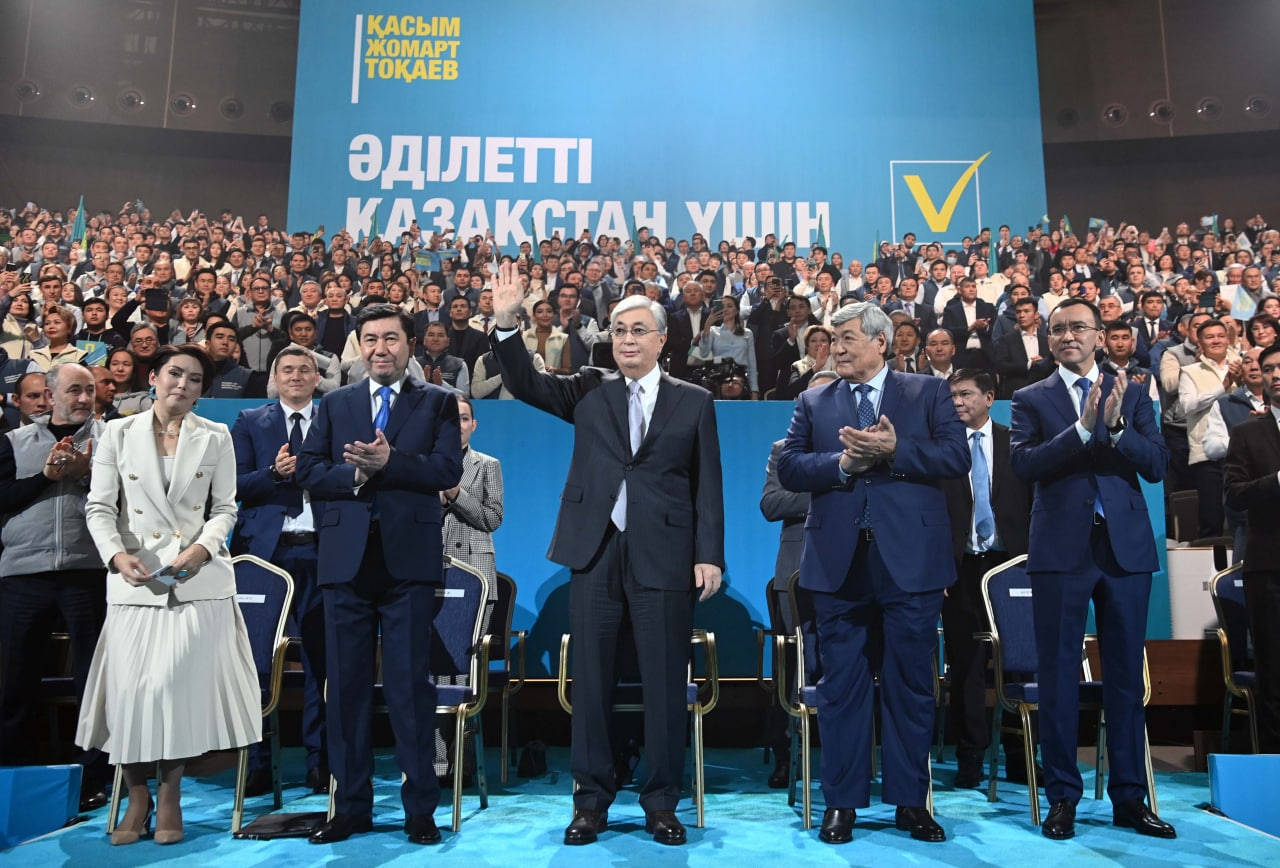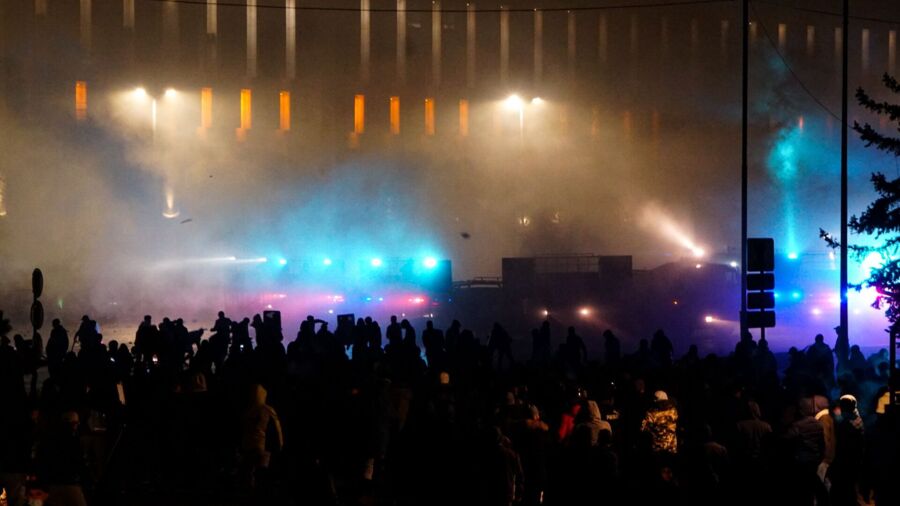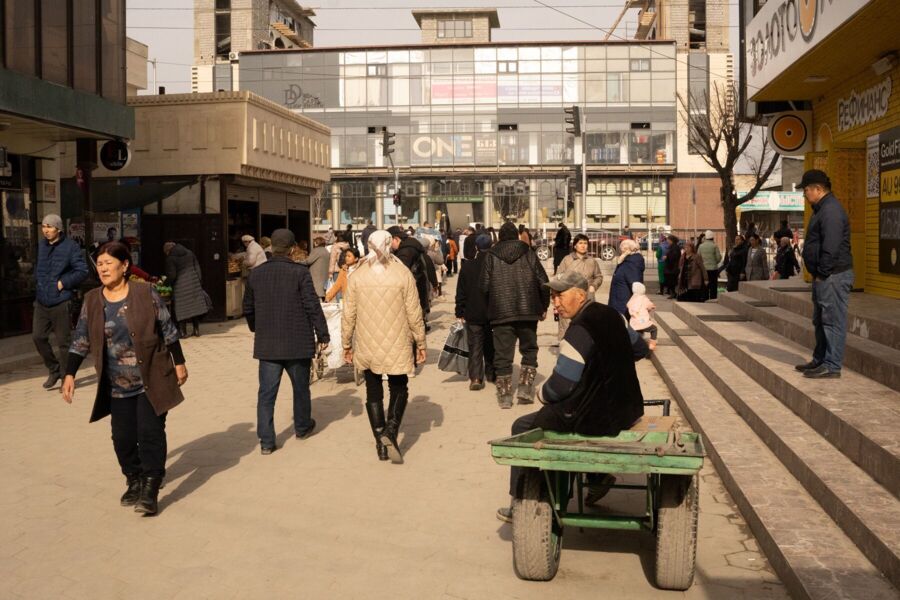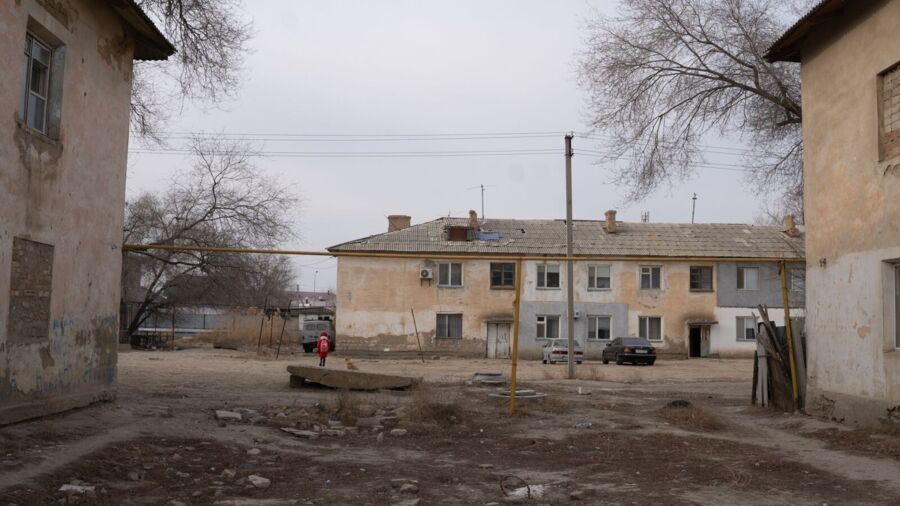On November 25, 2022, Kassym-Jomart Tokayev was re-elected as president of Kazakhstan on the promise to fairly distribute income and fight against oligopolistic capitalism. After two years, experts argue that the country's economic model has not changed. This model continues to boost inequality and promotes the concentration of resources among a small group of oligarchs.
Осы мақаланың қазақша нұсқасын оқыңыз.
Читайте этот материал на русском.
Tokayev was first elected president in June 2019. Some, however, argue that he only seized unrivaled control of the country after January 2022, when his orders to repress civil protests led to the killing of 238 people, events known as Qandy Qantar (Kazakh for ‘Bloody January’).
After Qandy Qantar, Tokayev openly stated that Kazakhstan’s economic system was "ineffective" in terms of wealth redistribution.
"You understand and know this well. The key beneficiaries of economic growth were financial-oligarchic groups," Tokayev said in a public statement in 2022.
According to him, when he was first elected, he tried to reform the system. This did not please “a separate power group,” Tokayev argued, without specifying who was part of this group.
In the aftermath of Qandy Qantar, Tokayev promised to build a "new" and "fair" Kazakhstan, which stood for a fair distribution of income and focused on increasing citizens’ incomes.
"Everyone who wants and can work will be able to find a decent job. Everyone who needs help will be supported by the state," he stated in his 2022 campaign website. Unsurprisingly, he won by a landslide. According to official data, 81.31% voted for him. Also unsurprisingly, international organizations said that these elections “lacked competition.”
The new policy included proposals for a progressive tax rate, a luxury tax, higher salaries, reforms in the healthcare and pension systems, the return of illegally-withdrawn assets from abroad, as well as the creation of various funds and initiatives, such as Kazakhstan Khalkyna and National Fund for Children.
Political analyst Dosym Satpayev told Vlast that the promise of social justice has become a presidential routine.
"Both [former President Nursultan] Nazarbayev and Tokayev liked to raise the issue of inequality. Because of the frightening January Events, in 2022 Tokayev just refocused his rhetoric on social justice. This was simply political technology, geared towards gaining trust from society," Satpayev said.
Stagnation
In the face of a stunted economic growth, Tokayev adopted the “Program for Increasing Population Incomes,” which aimed to increase the share of wages to GDP to 41.1% by 2029 (30.1% in 2022) and provide employment for 3.3 million people.
Despite the promises, this program is lagging behind its target indicators. According to the Bureau of National Statistics, in January-June 2024 the share of wages to GDP was 32.3%, far below the 36.4% level expected by the plan.
Also, despite a salary increase for public sector employees (by 75% in 2022 and by 100% in 2023), Halyk Finance analysts have recorded a decrease in earnings in education, healthcare, and public administration since 2023.
As for the fight against unemployment, the ministry of labor annually reports the creation of over 900,000 new jobs within the framework of regional projects. According to parliamentary research, however, around 87% of these jobs are temporary and in low-wage sectors.
Only 9% of workers are employed in high-wage sectors. More than half of the working population is employed in the public sector, where wages are below average and continue to decline in real terms.
Economist Kuat Akizhanov, who recently published “Finance Capitalism and Income Inequality in the Contemporary Global Economy”, believes that the problem of low wages and unemployment is not being solved because the political elite is not shifting the economic model in the country.
"Our assets are seized by a handful of people who are simply extracting rent. We need to engage in redistribution. In Kazakhstan, redistribution only works in one direction: towards the enrichment of the 1%. Instead, we need to redistribute to the benefit of the 99%. For example, through the expansion of social programs and raising wages. However, our government continues to follow the lead of big business,” Akizhanov told Vlast.
According to Akizhanov, the ideological dominance of neoliberal capitalism since independence, hinders the government from offering a “new paradigm of economic development”.
Galym Zhussipbek, a sociologist, added that the meager minimum wage and social rights show the absence of a social state in Kazakhstan.
"The current minimum wage of 80,000 tenge ($150) is not enough. Minimum wages should allow a person to live comfortably. If this is not the case, then the government is not protecting human dignity,” Zhussipbek told Vlast.
Against this background, Tokayev still plans to meet an annual growth goal of 6%, so that the GDP would reach $450 billion by 2029 (in 2023, it stood at $261 billion).
"Focusing on doubling the GDP is wrong, because this strategy does not improve the well-being of the population or the structural indicators of our economy. These are the same as they were 30 years ago. According to the World Bank, we belong to countries with above-average incomes. But this is far from true. The truth is that fewer than 100 people control one-third of the economy,” Akizhanov said.
In 2023, Kazakhstan’s GDP grew by 5.1%. Tokayev said that the government had managed to maintain the country’s “positive development dynamics.” Yet, Halyk Finance analysts noted that wage growth is still weakly connected to economic growth in most sectors.
“This is especially noticeable in the construction sector. We observed significant growth, while real wages fell,” Halyk Finance analysts wrote in a report.
Not Switching Gears
Government agencies constantly debate the introduction of a progressive tax rate, arguing that this measure could encourage the shadow economy. The government has also postponed the introduction of a luxury tax along with a new Tax Code.
“The super-rich people want to maintain the status quo. They don't want to pay more for their Lamborghinis and penthouses. As for the progressive tax rate, it's just a normal mechanism of economic democracy that exists in many developed countries," Akizhanov said.
In addition to the delays, other decisions that affected people’s purchasing power have offset any nominal increase of income.
The 2023 budget deficit triggered a government policy of “belt tightening” by which basic products were no longer protected by a price cap, while utility tariffs were increased along with fuel prices.
The government has routinely ignored the population's pleas to abolish the car disposal fee, lower the retirement age, and raise salaries and improve the labor code.
"The Nazarbayev system was corporatist: There was a close connection between the nomenklatura and financial-industrial groups. Therefore, the voices of big business and government officials were more audible than the voices of civil society representatives. The saying 'friends get everything, everyone else according to the law' still works under Tokayev," Satpayev said.
Tokayev’s conservative rhetoric shifts responsibility onto the workers.
"With social assistance, we have created a psychology of dependency in society," Tokayev said.
Trade unions, considered to be an important element for achieving social justice, are still under state control in Kazakhstan, while independent ones are subject to repression.
"In our country, trade unions and social justice are viewed as an obstacle. But these are some of the main tools for implementing progressive social policy and protecting fundamental rights in the country,” Zhussipbek said.
According to the Central Bank, the situation with poverty in Kazakhstan has not changed. The monthly income of nine out of ten residents of Kazakhstan does not exceed 151,000 tenge ($288). Statistics also show that almost 1 million Kazakhstanis live below the poverty line. Some experts even believe that the number of poor people in the country is much higher, since the state definition of the poverty level could be too conservative.
Looking at Kazakhstan’s Forbes list, the stated objective of a fairer income distribution has also failed. In May, the combined wealth of the country's 75 richest businessmen was reported to have grown by $8.2 billion, reaching $46.6 billion.
Halyk Finance analysts recorded a concentration of wealth among the top 10% of the population, which accounts for almost 25% of total income, while 50% of the population earns less than the 2023 minimum wage (70,000 tenge, or $133).
Even in high revenue sectors, such as the oil and gas industry, labor unrest and strikes continue.
Kazakhstan scores 3 out of 20 on the Inequality Transparency Index, a UN measure of the quality of data on income and wealth distribution.
Luca Anceschi, professor of Eurasian Studies at the University of Glasgow, questioned the essence of Tokayev’s “new” reforms.
"To me there is no such thing as New Kazakhstan. The redistributive agenda has simply not eventuated; the structure of the economy has remained unchanged, defined as it is by the permanence of oil revenues at the epicentre of a murky relationship between government and big business and the sustained failure to percolate down the profits reaped by the energy sector to the wider population of Kazakhstan,” Anceschi told Vlast.
“Poverty is on the rise and many people from the poorest segments of Kazakhstani society continue to be excluded from the government’s social assistance programs. Despite rhetoric, no substantive, encompassing change in social policy has been introduced in the post-Qantar years,” Anceschi added.
Anceschi argued that the relationship between the government and the oligarchy in Kazakhstan has not changed.
“The same non-democratic kleptocratic agenda followed during Nazarbayev’s last years continued to direct government policy after 2019. What has changed is only the identity of the people fostering this agenda,” Anceschi noted.
According to him, the “de-Nazarbayevification” efforts ultimately only marginalized certain business actors and led to the inevitable rise of a new group of oligarchs.
“In the Tokayev system, slogans still prevail over content. The president has not solved the biggest problem that Nazarbayev created: The economy does not belong to the people of Kazakhstan. It is still under the control of the oligarchy," Satpayev said.
The situation in the economy will only get worse, Akizhanov believes. He says that the population's income will decrease “due to endless currency devaluations and the policy of the Central Bank, which constantly increases the interest rate and kills local production.”
“In our country, authoritarian kleptocracy is being replaced by plutocracy, the power of the rich. In the next decade, only billionaires and their protégés will sit in parliament,” Zussipbek said.
Anceschi said that the population’s reaction to rising poverty and inequality will be framed by dramatic events, such as the fire in Astana in 2019 (which forced Nazarbayev to change his government) or a spontaneous reaction to sudden economic events, such as the rise in fuel prices in 2022, which provoked protests in Zhanaozen, triggering Qandy Qantar.
“It is through spikes of localised dissent or demonstrations focusing on rather limited sets of issues that the Kazakhstani public at large will be able to express their opinions of the government ’s socio-economic policies," Anceschi concluded.
According to Satpayev, having failed to resolve the problems that led to the 2022 protests, a popular uprising could repeat.
"Protests in Kazakhstan have not disappeared. The sentiment only accumulates. The entire history of local protests, from Shanyrak 2006 to Zhanaozen 2011, to during land reform rallies in 2015, showed that the government does not control the situation. While the government stays in its bubble, the rest of the country lives in another dimension," Satpayev said.
Поддержите журналистику, которой доверяют.











